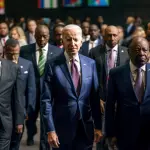Recent protests at Columbia University have gone too far, even for some faculty members. Students involved in these demonstrations have disrupted campus activities, threatened graduation ceremonies, and made it difficult for other students to focus on their studies. The university president has not taken strong action to stop the protests, leading to a situation that has spun out of control.
One faculty member, John McWhorter, wrote an article expressing concerns about the chaos caused by the protests. He pointed out that the relentless and loud activities of the protesters have made it nearly impossible for anyone, regardless of their background, to endure. While some argue that the protests are peaceful, the reality is that the constant disruptions and aggressive rhetoric have created an environment of fear and discomfort.
John McWhorter has decided that primitive word magic is real now and actually very dangerous… pic.twitter.com/wLb4jHsxjv
— Geoffrey Hughes (@geofffhughes) April 24, 2024
McWhorter compared the current protests to those at Rutgers University in the 1980s, where students spoke out against South Africa’s apartheid regime. While those protests were also passionate, they did not seek to shut down campus life or target specific groups of people. The current protests at Columbia have taken a different, more extreme approach, with the goal of disrupting and dominating campus activities.
These protests are not just about opposing the Israeli government; they have taken on a hostile and abusive tone. The use of social media and the influence of an antiracist academic culture have fueled a more intense and confrontational style of protest. By allowing these events to continue unchecked, the university is enabling a form of abuse that harms the entire campus community.
It’s clear that the situation has escalated beyond a reasonable form of protest, and the faculty at Columbia, like John McWhorter, are hesitant to speak out against it. The divisive and hateful nature of the protests is undeniable, and it’s time for the university to take a stand against such behavior. Students should be able to express their views, but they must do so in a way that respects the rights and well-being of others.




